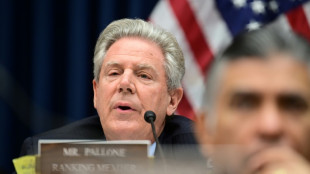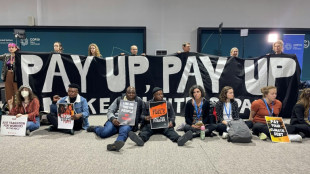
-
 US lawmaker accuses Azerbaijan in near 'assault' at COP29
US lawmaker accuses Azerbaijan in near 'assault' at COP29
-
Tuchel's England have 'tools' to win World Cup, says Carsley

-
 Federer hails 'historic' Nadal ahead of imminent retirement
Federer hails 'historic' Nadal ahead of imminent retirement
-
Ukraine vows no surrender, Kremlin issues nuke threat on 1,000th day of war

-
 Novo Nordisk's obesity drug Wegovy goes on sale in China
Novo Nordisk's obesity drug Wegovy goes on sale in China
-
Spain royals to visit flood epicentre after chaotic trip: media

-
 French farmers step up protests against EU-Mercosur deal
French farmers step up protests against EU-Mercosur deal
-
Rose says Europe Ryder Cup stars play 'for the badge' not money

-
 Negotiators seek to break COP29 impasse after G20 'marching orders'
Negotiators seek to break COP29 impasse after G20 'marching orders'
-
Burst dike leaves Filipino farmers under water

-
 Markets rally after US bounce as Nvidia comes into focus
Markets rally after US bounce as Nvidia comes into focus
-
Crisis-hit Thyssenkrupp books another hefty annual loss

-
 US envoy in Lebanon for talks on halting Israel-Hezbollah war
US envoy in Lebanon for talks on halting Israel-Hezbollah war
-
India to send 5,000 extra troops to quell Manipur unrest

-
 Sex, drugs and gritty reality on Prague's underworld tours
Sex, drugs and gritty reality on Prague's underworld tours
-
Farmers descend on London to overturn inheritance tax change

-
 Clippers upset Warriors, Lillard saves Bucks
Clippers upset Warriors, Lillard saves Bucks
-
Acquitted 'Hong Kong 47' defendant sees freedom as responsibility

-
 Floods strike thousands of houses in northern Philippines
Floods strike thousands of houses in northern Philippines
-
Illegal farm fires fuel Indian capital's smog misery

-
 SpaceX set for Starship's next flight, Trump expected to attend
SpaceX set for Starship's next flight, Trump expected to attend
-
Texans cruise as Cowboys crisis deepens

-
 Do the Donald! Trump dance takes US sport by storm
Do the Donald! Trump dance takes US sport by storm
-
Home hero Cameron Smith desperate for first win of 2024 at Australian PGA

-
 Team Trump assails Biden decision on missiles for Ukraine
Team Trump assails Biden decision on missiles for Ukraine
-
Hong Kong court jails 45 democracy campaigners on subversion charges

-
 Several children injured in car crash at central China school
Several children injured in car crash at central China school
-
Urban mosquito sparks malaria surge in East Africa

-
 Djibouti experiments with GM mosquito against malaria
Djibouti experiments with GM mosquito against malaria
-
Pulisic at the double as USA cruise past Jamaica

-
 Many children injured after car crashes at central China school: state media
Many children injured after car crashes at central China school: state media
-
Asian markets rally after US bounce as Nvidia comes into focus

-
 Tens of thousands march in New Zealand Maori rights protest
Tens of thousands march in New Zealand Maori rights protest
-
Five takeaways from the G20 summit in Rio

-
 China, Russia ministers discuss Korea tensions at G20: state media
China, Russia ministers discuss Korea tensions at G20: state media
-
Kohli form, opening woes dog India ahead of Australia Test series

-
 Parts of Great Barrier Reef suffer highest coral mortality on record
Parts of Great Barrier Reef suffer highest coral mortality on record
-
Defiant Lebanese harvest olives in the shadow of war

-
 Russian delegations visit Pyongyang as Ukraine war deepens ties
Russian delegations visit Pyongyang as Ukraine war deepens ties
-
S.Africa offers a lesson on how not to shut down a coal plant

-
 Italy beat Swiatek's Poland to reach BJK Cup final
Italy beat Swiatek's Poland to reach BJK Cup final
-
Japan, UK to hold regular economic security talks

-
 Divided G20 fails to agree on climate, Ukraine
Divided G20 fails to agree on climate, Ukraine
-
Can the Trump-Musk 'bromance' last?

-
 US to call for Google to sell Chrome browser: report
US to call for Google to sell Chrome browser: report
-
Macron hails 'good' US decision on Ukraine missiles

-
 Italy eliminate Swiatek's Poland to reach BJK Cup final
Italy eliminate Swiatek's Poland to reach BJK Cup final
-
Trump expected to attend next Starship rocket launch: reports

-
 Israeli strike on Beirut kills 5 as deadly rocket fire hits Israel
Israeli strike on Beirut kills 5 as deadly rocket fire hits Israel
-
Gvardiol steals in to ensure Croatia reach Nations League quarter-finals


Regime change, the controversial strategy the US no longer wants
The United States says it is not seeking a "regime change" in Russia, hasty clarification that shows the strategy once popular among neoconservatives has become a hot button issue after negative experiences in Iraq, Afghanistan and Libya.
President Joe Biden caused a stir Saturday when, during an impassioned speech in Warsaw, said his Russian counterpart Vladimir Putin "cannot remain in power."
The White House rushed to downplay the phrase, which was not part of Biden's prewritten remarks, insisting the US leader was not suggesting a regime change in Moscow.
But Biden refused to walk back the comment Monday, although he said he was only expressing his "moral outrage," not outlining a policy to overthrow Putin.
Even hinting at such a tactic appears taboo in Washington.
"Regime change might sound appealing because it removes the person associated with policies we don't like," Sarah Kreps, a government professor at Cornell University, told AFP. "But it almost always leads to instability."
- 'They haven't worked' -
US Secretary of State Antony Blinken has made refusing regime change a central tenet of his diplomatic approach, promising as early as March 2021 not to "promote democracy through costly military interventions or by attempting to overthrow authoritarian regimes by force.
"We have tried these tactics in the past. However well-intentioned, they haven't worked," he said.
The history of US foreign policy is littered with such attempts both clandestine and overt -- and more or less successful -- to resolve a crisis by replacing the leaders of an adversary country.
It first took place in Latin America, when the CIA played a role, particularly during the Cold War, in military coups aimed at overthrowing left-wing presidents.
But the regime change strategy did not disappear with the rise of the Iron Curtain: now the only global superpower, and confident of being untouchable, the United States began asserting its power even more overtly at the turn of the 21st century.
As early as 1998, a Congressional text signed into law by Democratic president Bill Clinton stated that "it should be the policy of the United States to support efforts to remove the regime headed by Saddam Hussein from power in Iraq."
When Republican George W. Bush arrived at the White House in 2001, he surrounded himself with neoconservative figures -- sometimes branded as war hawks -- who theorized a return to American interventionism as a way to promote the democratic model.
The September 11 attacks accelerated the shift. The "war on terror" quickly led to the fall of the Taliban in Afghanistan.
Soon after, Washington put its words about Saddam Hussein into action during the 2003 Iraq War, by overthrowing him after wrongly accusing him of hiding weapons of mass destruction.
- 'Catastrophic' -
In Libya, the 2011 intervention by Washington and its European allies was officially to protect rebels who took up arms against Moamer Kadhafi during the Arab Spring uprising. But the mission was actually extended until the death of the Libyan dictator.
In Afghanistan, Iraq and Libya, the primary objective of bringing the regime down appeared to have been quickly achieved.
On the other hand, the goal of "nation-building", or the necessary construction of a stable -- and Western-allied -- state to succeed the fallen power, ended in failure at best.
The jihadist Islamic State group took advantage of Iraqi instability in the mid-2010s. Twenty years of costly military presence in Afghanistan ended in fiasco when the United States withdrew last summer, only to see the Taliban sweep back to power.
Libya is still unable to extricate itself from a decade of chaos.
US politicians, almost unanimously aligned with a public opinion weary of the "endless wars" waged on the other side of the world, are now promoting a less interventionist foreign policy.
Without the military option, though, the United States does not necessarily have the means to achieve its ambitions. Under the presidency of Donald Trump, Washington wanted to force Venezuelan President Nicolas Maduro from power through a campaign of international sanctions -- a plan that ended in failure.
From the beginning of the war in Ukraine, Biden drew a red line: never enter into direct confrontation with Russia, to avoid a "Third World War."
For Kreps, the professor, "even the most hawkish policy makers seem to have learned from the foreign policy outcomes of the last few decades."
"The instability in Libya, Iraq and Afghanistan were bad enough, but instability in a country with thousands of nuclear weapons would be catastrophic," she said.
E.Flores--AT
